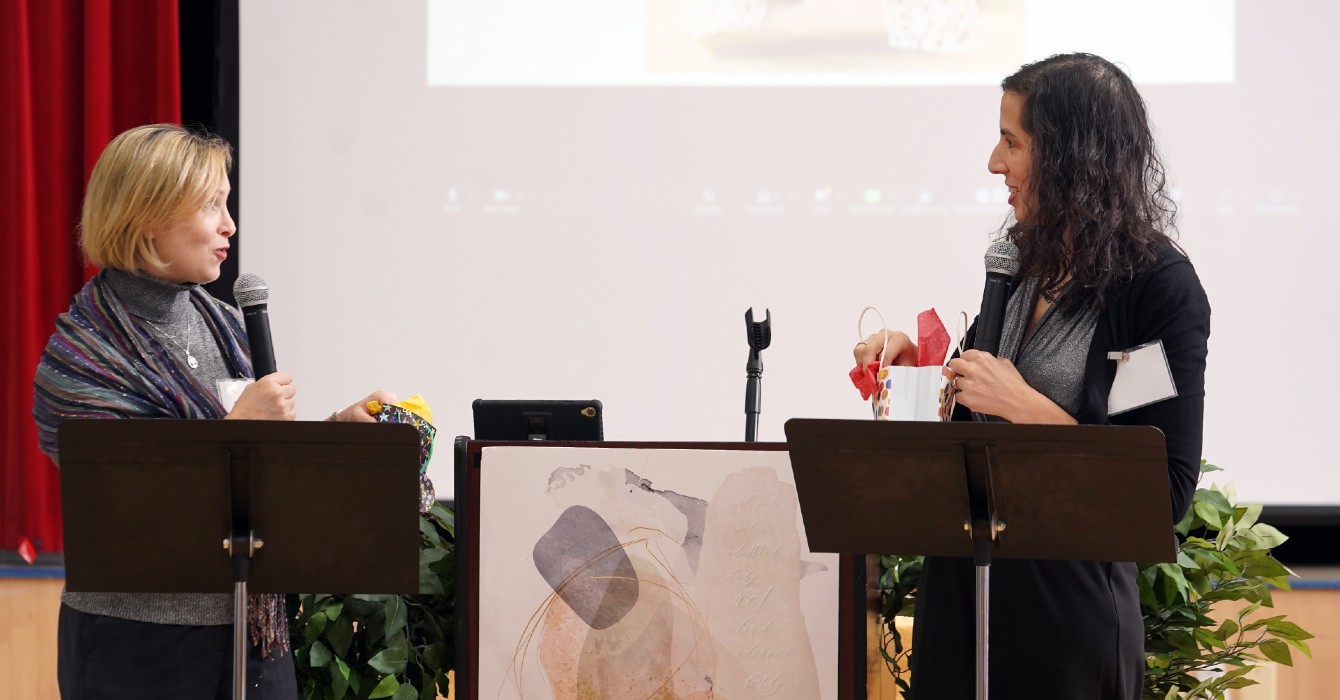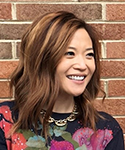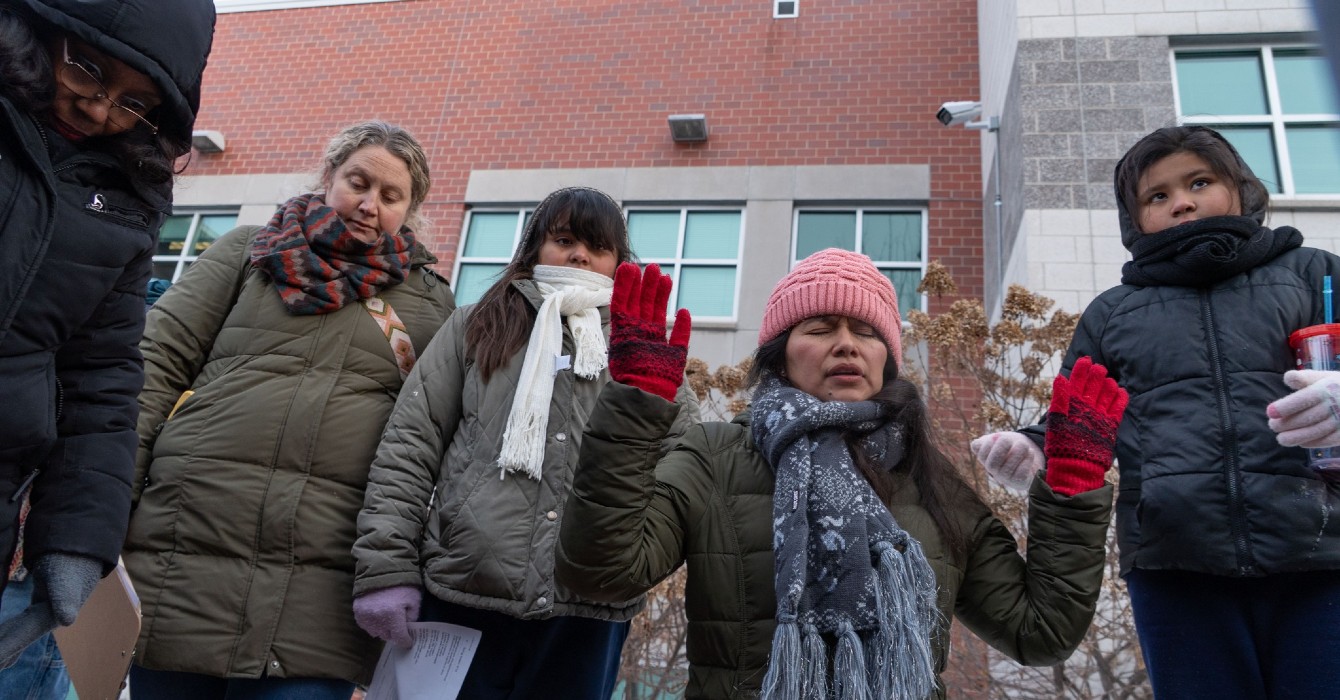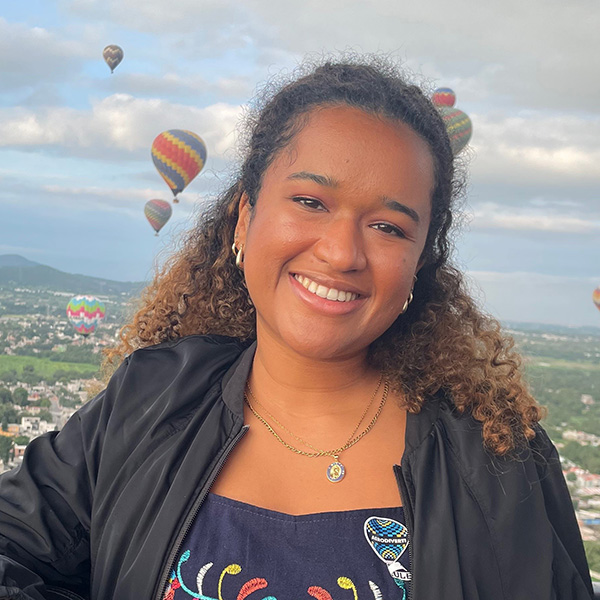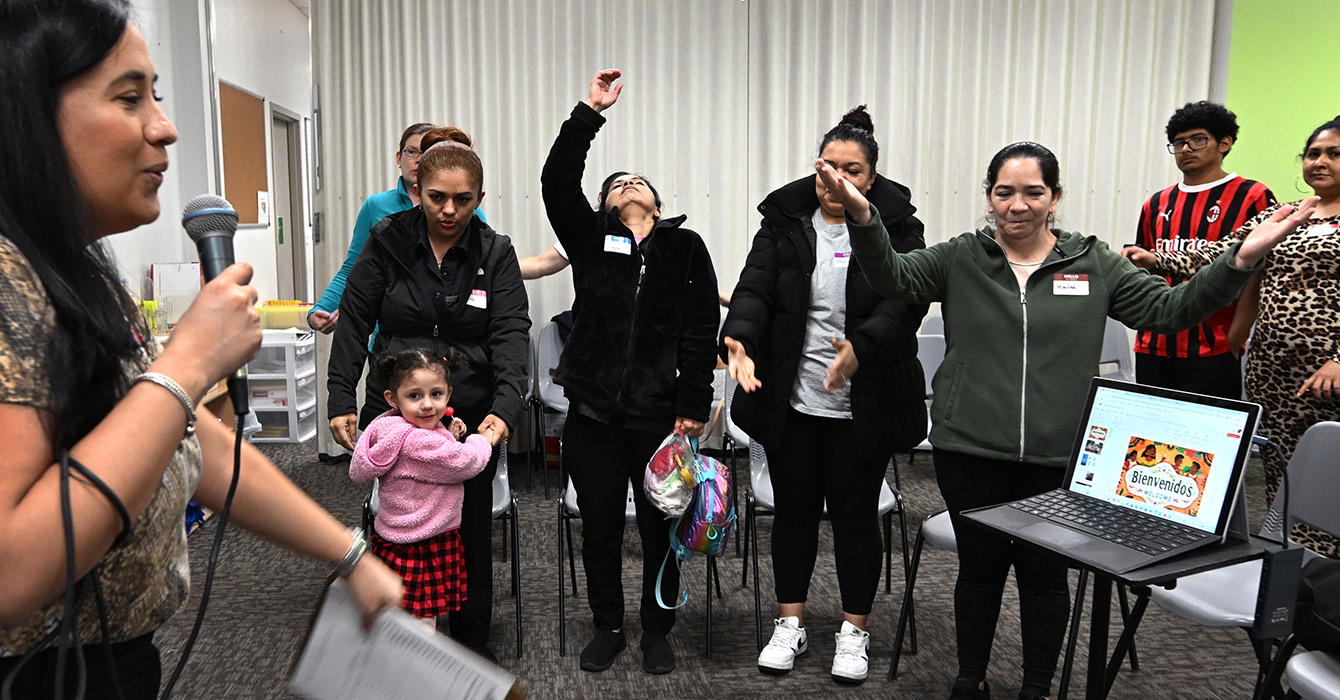On a chilly Sunday morning in a Rockville, Maryland, classroom, a group of eighth graders is deep into a discussion about whether there’s an afterlife and — if so — what it might entail.
A few fairly standard depictions of heaven and hell give way to questions about reincarnation, reunion with lost loved ones, karma, ghosts, and whether we’re all just on a loop as in a video game, “rebooting” in an effort to level up.
“What if this is my five millionth time living this life?” wonders one 13-year-old, who appears equally amused and alarmed by the concept.
“You mean like ‘Groundhog Day’?” asks a classmate, referencing the 1993 Bill Murray film.
“That might be what causes deja vu,” suggests a third.
Co-teachers Rob Liebreich, who is Jewish, and Erika Callaway Kleiner, who is Christian, encourage some of the quieter students in the classroom and a handful participating by Zoom to chime in, but the teachers rarely interrupt as the students riff off each other and try to discern what, if anything, they believe.

Each student is in the second year of the Coming of Age program at the Interfaith Families Project of Greater Washington, D.C., a faith community that dates back almost 30 years. Most of the member families here have one Jewish partner and one Christian partner, but agnostics and atheists are equally welcomed. The IFFP’s weekly Sunday “gatherings” — a term preferred over “worship services” — include Christian and Jewish elements and are orchestrated by IFFP’s spiritual leaders, Rabbi Debbie Reichmann and the Rev. Samantha Gonzalez-Block, along with IFFP members who recite Scripture, say blessings and lead responsive readings.
Roughly 100 families call IFFP home — part of a growing contingent of interfaith families in the U.S. According to the Pew Research Center’s Religious Landscape Study, published in 2015, nearly half (49%) of unmarried couples are living with someone of a different faith. The percentage has grown steadily over the last six decades.
While many interfaith couples are encouraged to choose either church or synagogue and raise their children in one faith, IFFP offers a both/and option. Members learn about the spiritual practices as well as the histories and core beliefs of both; all the major holidays are celebrated.
“It’s a ‘project’ because we keep changing and evolving,” said Reichmann, who became a rabbi specifically to serve interfaith communities. “I love this work. It’s exciting to me to see these changes and foster a whole new way.”
“There’s a real openness to it, a generosity of spirit, with people wanting to try new things,” added Gonzalez-Block, who is IFFP’s first spiritual leader raised in an interfaith home.

Author Susan Katz Miller, a member of IFFP, grew up with a Jewish father and a Christian mother. She said IFFP and similar communities are a welcome alternative for people from religious institutions where the full breadth of their faith experience was not honored.
Maybe they weren’t considered Jewish or Christian enough because of ancient ancestral traditions. Maybe their spouses couldn’t hold the Torah or take communion because they hadn’t converted. And churches and synagogues often frown on dual education for children, saying it confuses the kids, said Katz Miller, who disputes that claim in her 2013 book, “Being Both: Embracing Two Religions in One Interfaith Family.”
Frustrated with outside pressure from extended family members and institutional gatekeeping, some interfaith families opt to join the growing ranks of the religiously unaffiliated rather than try to navigate everyone else’s expectations, she said.
Developing a religious identity
At IFFP, members are encouraged to embrace the religious practices that are meaningful to them, discard the ones that aren’t, and help their children make educated, individual choices about what — if any — faith practices they’d like to pursue.
“I grew up as an interfaith child without any way to affirm my interfaithness, without any institutional acknowledgment of what that meant,” Katz Miller said. “When I found IFFP, I immediately knew this was a groundbreaking idea.” Katz Miller’s two children grew up at IFFP.
“More and more people have become aware of the idea that both/and, rather than either/or, is not only an accurate way to describe our identities — whether it’s race, religion, gender or something else — but can be a fulfilling, inspiring and creative way of looking at the world and at ourselves,” she said.

IFFP emphasizes community over creed, and members are encouraged to pursue social justice and public service. Most importantly, they are never asked to abandon key parts of themselves.
“First and foremost, people are thrilled to belong — and to belong equally alongside their partner, if they have a partner,” Gonzalez-Block said. “The fact that these families, these kids have a community is huge.”
Part of that community has been virtual since the pandemic, with interfaith members hailing from as far away as South Africa and Romania. IFFP’s $350,000 annual budget is entirely member supported.
Reichmann, who grew up Jewish, left a decadelong career in health policy after deciding it wasn’t a good fit. Looking for something different, she accepted a job with the Georgetown University Department of Campus Ministry, handling programming for students and colleagues of all faiths. Her joy in that position inspired her to become a rabbi; she was ordained in 2012 through the Jewish Spiritual Leaders Institute, where she was trained as a Jewish Universalist rabbi.
Gonzalez-Block grew up with a Jewish father and a Presbyterian mother. The local synagogue wouldn’t welcome her to Hebrew school unless her parents committed to raising her solely Jewish, something they declined to do. She would be confirmed at 13 in her mother’s church and would celebrate her bat mitzvah at 23. She earned a master of divinity at Union Theological Seminary in New York City and was ordained through the Presbyterian Church.
The children who attend IFFP’s Sunday school are encouraged to develop their own religious identities. The Chicago Interfaith Family School has offered similar programming to children of Catholic and Jewish heritage since 1993. And on Long Island, New York, the Brookville Multifaith Campus provides worship and classroom space to four faith communities: a church, a synagogue, a Muslim study and prayer group, and the Interfaith Community of Long Island, which offers dual-faith education to children of Jewish and Christian heritage.
“Part of my job is always reminding people the kids are going to be OK,” Gonzalez-Block said. “I don’t feel confused or messed up. Growing up this way was such a blessing.”
How can you bless the different ways parents in your community are raising their children?
‘Your interfaithness — it’s trailblazing’
Four “founding moms” — Irene Smith Landsman, Stacey Katz, Laura Steinberg and Mary Joel Holin — are credited with launching IFFP in 1995. All were in interfaith marriages and had spent years seeking a religious home where their families would be welcomed as is and their children could be educated in both Christian and Jewish practices.
When they couldn’t find any place that embraced them equally, the Maryland women and their husbands borrowed space inside a Takoma Park Presbyterian church and started an interfaith Sunday school for children ages 7 to 10. Landsman recalled that the first teacher IFFP hired, a Jewish college student, lasted about two weeks — her parents disapproved of her teaching at an interfaith school. Parents pitched in, and the Sunday school operated more like a co-op initially, she said.
“I think the core of it was what we wanted for our children, for them to be comfortable with the traditions on both sides so if they went to a bar mitzvah they’d know what was happening or if they went to Mass they’d know what was happening,” said Landsman, whose background includes Unitarianism and Catholicism and whose late husband, Ron, was Jewish.

As more families enrolled their children in IFFP’s classes, Landsman said, she began to realize how much pent-up demand there was for an interfaith community. In 1998, IFFP hired its first staff member, the Rev. Julia Jarvis, to serve as the director of the Sunday school. She later became IFFP’s spiritual director, retiring in 2021.
Jarvis, who was ordained in the United Church of Christ, had been providing clinical pastoral care at Georgetown University Hospital. She had come to appreciate the common threads among all the faiths and didn’t want to work in a solely Christian environment. She recalled that the parents who ran IFFP were committed to establishing a supportive community for families like theirs.
“They were growing really fast, and they were all volunteers. And they were exhausted,” Jarvis said. “We all just fell in love with each other.”
She initially contacted the Interfaith Family School in Chicago for teaching materials, and she still remembers how excited she was when the first curriculum arrived via FedEx. Parents taught the classes in pairs, one Jewish and one Christian, a tradition that continues today.
Jarvis and others with IFFP also established the two-year Coming of Age program, in which seventh graders forge a relationship with a mentor and explore which religious values and traditions are most compelling to them before wrestling, as eighth graders, with six questions: Who am I? What does it mean to live a meaningful life? How do we build the beloved community? Why do bad things happen? Is there an afterlife? Who or what is God?
Jarvis said they initially incorporated materials from Episcopal and Unitarian Universalist churches as well as from the Washington Ethical Society, a humanistic congregation. The six questions were inspired by Edward R. Murrow’s “This I Believe,” a 1950s radio program where people wrote short essays about their guiding principles and shared them with listeners. At the end of the school year, the eighth graders deliver individual presentations addressing one of the six questions and explaining how their beliefs have shaped their identities thus far.
What values and traditions are most important to the young people in your community?
Throughout their time in IFFP’s Sunday school, students learn about the shared values of Christians and Jews as well as the history of conflict between the two religions. They study Jesus from a historical perspective and hear stories from the Torah and the New Testament, not so much to consider the truth of those stories as to derive some meaning from them, said Miranda Hovemeyer, IFFP’s administrative director. Teachers regularly ask students open-ended questions: What do you believe happened, given what you’ve learned? How might you respond in a similar situation?
“We’re inviting the children to have their own opinions of things,” Hovemeyer said.
Members of IFFP’s current class of eighth graders have plenty of opinions and even more questions as they spend a recent Sunday session referencing everything from Norse and Greek mythology to Matthew 25 in an effort to get to the bottom of what happens after death. One student pauses the discussion to read the results of a recent Gallup Poll highlighting Americans’ waning belief in heaven and hell. Another consults his cellphone: “Siri,” he whispers, “what is purgatory?”
Eventually, the teens turn their attention to whether one’s experience in the afterlife — if such an experience even exists — is linked in any way to how that person has lived. Elyse Fioravanti, 13, comments that life feels too complex for the most basic of religious tenets — that good people go to heaven and bad people go to hell.
“What defines if you’re a good person or a bad person? There’s nobody who hasn’t done bad things. What’s the line?” asks Elyse. “Everybody’s done something they’ll regret. Who decides what’s good enough?”
And what if there isn’t enough time in the average person’s 70-to-90-year life span to secure a prime spot for all of eternity? wonders Ari Bernstein, also 13.
“That 70 years decides what happens for the rest of eternity?” he asks, a little incredulous. “How does 90 years decide infinite years? What if you just had a bad century?”
How do you create the conditions for children to cultivate their own opinions about their faith?

Jill Fioravanti, Elyse’s mother and a former IFFP board chair, said she loves that her three children and their classmates feel comfortable asking theological questions. Fioravanti, who grew up Jewish, said she and her husband, Marc, who was raised Catholic, had felt the sting of rejection as an interfaith couple. They’d had to fly in an interfaith-friendly rabbi from Boston to conduct their Chicago-area wedding ceremony after the rabbi at her parents’ synagogue declined. Another rabbi refused to perform a baby-naming ceremony for Elyse after the couple declined to give her a solely Jewish education; a layperson who had studied Judaism agreed to do it instead, said Fioravanti.
At IFFP, her children are able to develop their own religious identities without any pressure or judgment, Fioravanti said.
“What I appreciate at IFFP is that they’re getting the kids to critically think,” she said. “The whole idea of questioning and thinking about questions that don’t have clear or easy answers — that is a life skill.”
Elyse said she largely identifies as interfaith because she’s learned so much about both of her parents’ religions. But when she tries to explain that to friends outside IFFP, “they don’t totally get it, and it’s hard to explain to everyone,” she said. To simplify, she often just says she’s Jewish.
For her Coming of Age project, Elyse plans to address the issue of how to build the beloved community, she said, something she’s found at her dance studio and, to some extent, with her classmates at IFFP who have been together since the second grade.
“I’ve learned how to grow with people. You learn how to coexist,” she said, adding that her dual-faith education has helped her connect with both sides of her family. “I’m actually really grateful that [my parents] took the time to find IFFP, even if the conversations are difficult and you have to wake up early in the morning to get to class. Overall, I’ve learned so much, and I think there would be such a gap in that knowledge if I’d learned about only one or none.”
Nearly 100 children are enrolled in IFFP’s Sunday school and Coming of Age programs.
“To those children, I say, ‘You are wonderfully and beautifully made. You’re a bridge builder just by being you. You’re a product of love, and you extend that love to the world by being a little bit bilingual,’” Gonzalez-Block said. “‘Your interfaithness — it’s trailblazing.’”
What does it look like for a child to develop their own religious identity?
‘Love across boundaries’
While the early days at IFFP were largely focused on educating children, Jarvis, who describes herself as a spiritual person who has also embraced Buddhism and mindfulness practices, urged the organization to add a worship component to its Sunday schedule. This could have been a minefield, but Jarvis said she and IFFP’s members addressed early on the parts of religious services that might cause discomfort.
They dealt with vocabulary, referring to services as “gatherings” rather than worship. Following a reading from the Torah or the New Testament, Jarvis would deliver a “reflection” rather than a sermon. And vocalists steered clear of hymns but sang plenty of Pete Seeger tunes.
“Sometimes, you just change the rhetoric, and everybody can relax,” she said.
The initial gatherings lasted about 15 minutes and took place in the hallway of a middle school, where IFFP moved after outgrowing space at the Presbyterian church. But pretty soon, members insisted that gatherings have a legitimate space and become a regular part of the Sunday routine. In 2010, IFFP hosted its first Easter gathering, and the following year, its first High Holy Day gathering.
On a recent January Sunday, a sign projected onto a screen at the front of the space encouraged those who “don’t connect to God language” to replace uncomfortable terms with “universal love” or “nature.” The hourlong gathering — now held at a Jewish day school in Rockville — featured choir-led renditions of “Uyai Mose (Come, All You People)” in both English and the Bantu language of Zimbabwe, “We Three Kings” in English and Spanish, and “We Shall Overcome.” Members chanted the Lord’s Prayer, and they sang the Shema in Hebrew and the V’ahavta in English — both central prayers in any Jewish worship service.

During children’s time, the youngest members of IFFP heard the tale of the wise men visiting the baby Jesus. The story of Epiphany was referenced again later in a reading from Matthew and during the day’s reflection, a conversation between Reichmann and Gonzalez-Block about the importance of welcoming the stranger and using one’s gifts to lift up the oppressed and others in need.
Members recited prayers from the Methodist and the Catholic traditions before the children headed to classes and the adults settled in for a racial justice presentation by Eleanor Hancock, the director and co-founder of White Awake, which combats white supremacy.
During the gathering, Greg and Ilissa Seroka’s 4-year-old daughter, Leia, colored while 1-year-old Sadie played on an oversize quilt with other children. Both girls had a “Christennaming,” a joint christening and baby naming celebration, led by Reichmann and a local Catholic priest who’s a member of the Washington Interfaith Network.
Greg is a devout Catholic, and Ilissa was raised Jewish. The couple thought long and hard about how to share their different faiths with their children. Before the girls were born, the Serokas read books, watched documentaries and consulted with family, friends and clergy. Neither felt entirely at home in the other’s house of worship, and they didn’t want to choose one over the other. They briefly considered sending their daughters to both catechism classes and Hebrew school before discovering IFFP.
“There’s a lot of worry or panic — ‘How are we gonna do this?’ We chose a challenging path,” said Greg, a meteorologist and oceanographer. “But it’s really important for me to show my kids, ‘This is how I was raised and what I believe.’ IFFP allows for that. When we go to IFFP, our walls are down.”
“I have to say, it has far exceeded our wildest dreams. I don’t know what we’d do without it,” said Ilissa, a climate scientist. “We’re both scientists, but there’s no quantitative way to measure that feeling of pure happiness and weight off our shoulders. It solved this major problem for us.”

Jennifer Loukissas, who grew up interfaith and identifies as Jewish and agnostic, joined IFFP with husband Doug Lynott, who is Catholic, in 2017. Their oldest son had started school, and some of his friends were already enrolled in religious education.
“He came home with all these ideas about Jesus and God, and we were like, ‘He can’t be educated by his peers on the playground,’” recalled Loukissas, who now chairs IFFP’s board of directors. Initially, she said, her oldest son didn’t identify with any religion. Now, at the age of 15, she said, he calls himself interfaith.
Katz Miller, who has published a workbook to help interfaith families decide what faith journey to take, said she’d like to see more seminarians trained in how to support interfaith families. In addition, she said, clergy and institutions should prioritize practice, culture and community as the central tenets of religion, rather than creed, which can be exclusionary.
“Once you let go of creed as the most important part of religion, it becomes easier to practice more than one,” she said, noting that in many parts of the world, multifaith practices are common.
While Katz Miller said she understands concerns within the Jewish community about continuity, she bristles at the claim that somehow interfaith communities like hers are weakening religious institutions or “watering down” religion.
Children who grow up with dual-faith education often have an appreciation of more than one religion, she said. And while researching her book, she spoke with many individuals who had strengthened their own religious connections and learned more about their partners’ religions after participating in interfaith communities.
“I see this as building something new and exciting,” Katz Miller said. “Something inspiring built of people who choose to love across these boundaries.”
How is your congregation encouraging practice, culture and community over creed?
Questions to consider
- How can you bless the different ways parents in your community are raising their children?
- What values and traditions are most important to the young people in your community?
- How do you create the conditions for children to cultivate their own opinions about their faith?
- What does it look like for a child to develop their own religious identity?
- How is your congregation encouraging practice, culture and community over creed?

